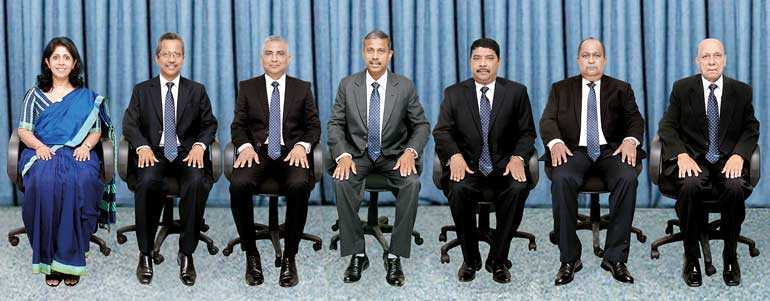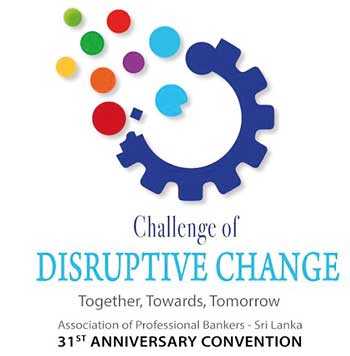Friday Feb 27, 2026
Friday Feb 27, 2026
Thursday, 11 July 2019 00:00 - - {{hitsCtrl.values.hits}}

APB Advisory Committee 2019-2020 From left: Aravinda Perera, Bhanu Wijayaratne, Deepal Abeysekara, Senarath Bandara, C. Amarasinghe, A. Kathiravelupillai, Hennanayake Bandara, Piyal Hennayake and Shashi Kandambi Jassim

APB Fund Management Committee 2019-2020 From left: Shashi Kandambi Jassim, Piyal Hennayake, Jeremy De Zilva, C. Amarasinghe, B.A.H.S. Preena, Deepal Abeysekara and Nimal Dias
Banks have flourished during good times, and have managed to minimise the ill effects of bad times. If one were to say that the present time is a bad one Professional Bankers of Sri Lanka would respond that they have seen and prevailed over worse times. The cyclic phases of the economy, regulation, technology and competition are ever so familiar to bankers perhaps more than other businessmen or professionals.
In the world scene China-US trade relations have entered a crucial stage with the US raising tariffs on Chinese imports as the US trade deficit is widening and China threatening retaliatory action. 
The regional economic giant India has its own plans for gaining regional economic leadership. Whilst the countries in the ASEAN region have adopted common policies and are advancing together, the countries in the SAARC region have for some reason lagged far behind.
Banks have also to deal with a multitude of risks and those risks do shape the regulations. They originate from the wakeup call of the fallout from the global financial crisis, as a result of which there was a global consensus on managing the risks that the industry was facing. Subsequently some nationalist and populist movements turned the tide, and the cyclic pattern reappeared in regulation and deregulation.
The US has vowed to ‘dismantle’ the post-crisis Dodd-Frank regulatory regime. As regulators are still finalising previously outlined rules, financial institutions are continuously facing an array of risks that come with new types of entrants, technologies, ever-growing complexities of national and international regulations, as well as the advancement of technology and changing consumer behaviour.
During the past few years various regulations were imposed with the noble objective of ensuring a stronger banking sector, particularly in capital requirements and provision treatments. The Basel III regulation has led to more stringent regulations in capital, liquidity and leverage.
The new and strict regulations that have come into force are expected to have a major impact on the core capital and bottom lines of all banks. The requirement for more high quality capital, which has larger loss absorbing capacity, has led banks to raise capital through rights issues in the recent past and to consider equity infusions, increasing the pressure on the shareholders.
The pace of technology-enabled innovation has increased exponentially over the last decade, resulting in new business opportunities in the banking industry. There are also transformational issues created by the fintechs shaping the financial services industry. New developments in telecommunications, big data, artificial intelligence, Blockchain and ‘crowd activities’ within the ‘Internet of Things’ appear to have a deep effect on the bank of the future.
The banking industry is rapidly evolving as new trends and new technologies continue to reshape the future of banks. New players arrive constantly challenging the status quo and changing the ecosystem that the banks operate in.
Banks have to develop their strategies to proactively address the impact of digitalisation on areas such as compliance, accountability, transparency, risk management and data governance. In this environment banks need to draw the roadmap for their industry. Banks need to collaborate as well as compete with the fintech entrants.
The technological evolutions have fundamentally changed the way customers expect to interact with banks. Customers demand to be served through multiple channels, and desire an improved client experience, secure transactions, and better control over the privacy of their data to protect against fraud.
Also increasingly environmentally conscious customers are demanding that even the Banks to adopt green concepts. Banks are voluntarily moving or pushed, towards green lending. Green loans are the loans granted for a range of environmental and sustainability projects spanning areas including energy efficiency, renewable energy, green transport, sustainable food, agriculture and forestry, waste management and greenhouse gas emission reduction. Also the regulators and the financiers are demanding that the banks assess and minimise the impact on the environment by the projects being financed.
In an ecosystem where customers demand a better experience, banks are struggling to deliver a perfect customer experience whilst being restrained by the expensive regulatory requirements and operating in a battlefield of trading superpowers.
In this environment, engrossed in fierce competition with each other, bankers seem to be oblivious to the fact that they are hurting each other, and this competition is hurting the banking industry in general. Being aware of the dangers posed by non-bank entities such as fintechs encroaching into their space, bankers seem to be too exhausted to react to the external threats, or feeling too restrained by reins of the regulatory might.
The bankers were traditionally tasked with ensuring internal financial discipline. Now the bankers are tasked with the additional burden of assisting the authorities in the prevention and law enforcement with respect to financial crime. Also the demanding customers now have multi-channel complaint escalation processes.
How do banks cooperate and cope with these additional demands?
They hope to seek answers to these questions at the 31st Anniversary Convention of the Association of Professional Bankers – Sri Lanka, titled ‘Challenge of Disruptive Change – Together Towards Tomorrow’.